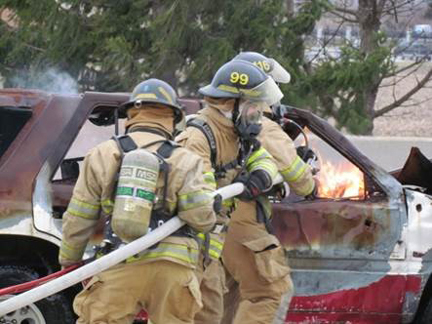BY RADONNA FIORINI
PHOTOS PROVIDED
They build the roads. They construct the houses. They care for the elderly. They put out fires. They keep your car running. They are the thousands of Tippecanoe County residents who make a living in industry and trade professions, and there is a growing need for more of them.
Current economic drivers make it critical for the community to attract and keep carpenters, bricklayers, electricians, plumbers and others in the construction and building trades, says Stephen Snyder, president of the Tippecanoe Building Trades Council, which represents 17 trade associations and unions in nine central Indiana counties.

And many students are suited for careers in such fields as culinary arts, information technology or nursing that require technical training or certification, but they may not be aware of the available options, says Miranda Hutcheson, director of Career and Technical Education at the new Greater Lafayette Career Academy.
Trades and technical jobs are plentiful and critical to any community’s economic health and Snyder and Hutcheson’s organizations, in cooperation with others, are creating opportunities for students to explore different career paths and have hands-on experience by the time they graduate from high school.
Some students want to get first-hand experience before committing to a university program, and others want to get into the work force as soon as possible, says Hutcheson. Apprenticeships through the trades council and classes and training through the career academy provide those opportunities, and come at a critical time.
A “perfect storm” of circumstances has led to the current need and cooperative push to interest students in such careers, Snyder says:
• The population is aging, and many skilled professionals such as plumbers, roofers and sheet metal workers are retiring.
• The construction market is hot and in need of skilled workers.
• Families and students are increasingly concerned about the cost of a college education and paying back student loans.
“A lot of parents, students and high school counselors are excited about our apprenticeship programs that will lead to a good job without a mountain of debt,” says Snyder. Students willing to work hard can complete a three- or four-year apprenticeship and get a job that pays a living wage, allowing them to buy a home and raise a family.
And students can get a leg up on an undergraduate degree by taking college-level courses for free through the career academy while still in high school, says Hutcheson. She estimates that college-bound students in some fields can save from a few hundred dollars to $10,000 in university tuition costs, and the academy allows students to explore different careers before committing to a course of study after high school.
The first phase of the academy opened last August in the former Lafayette Life Insurance building on South 18th Street in Lafayette. Indiana has long been home to such career centers, and local educators and industry representatives talked about opening one for several years. The pieces fell into place when the building became available and all three county school districts decided to work together to get it up and running, Hutcheson says. Snyder sits on the advisory board of the career academy, as do a number of other local industry partners who help review community needs and determine what programs are offered.
There are 187 students from four local public high schools currently enrolled in half-day academy programs. These juniors and seniors attend regular classes at their schools in the morning and are bused to the academy each afternoon for specialized training. Training in health science, auto service technology, cosmetology, engineering/manufacturing, communications and TV/radio, construction/architecture, culinary arts, information technology, education and public safety currently is offered.
Some also are placed in the community and get hands-on training with local businesses in such areas as civil engineering, electrical contracting, clinical positions and building and contracting. While the academy is developing lab space for technical training, community partners provide a number of valuable resources, Hutcheson says. For example, students interested in firefighting are able to use the county fire training facility.

“These kids are my trailblazers,” says Hutcheson. “Scheduling is a challenge, but these students can pick up 17 dual credits and three industry certifications,” through the academy before leaving high school.
Lamont Johnson and Tucker Bogue are two of those trailblazers. Both 18 and seniors at West Lafayette High School, the young men will graduate in May with a high school diploma and a Certified Nursing Assistant certificate, after passing the state certification test. They hope to continue their education and become physical therapists.
“I knew I wanted to help people since I was little,” Johnson says. “I found out about this from my school counselor who knew what I wanted to do in college. Tucker and I have similar passions.”
Bogue became interested in physical therapy after suffering a series of knee injuries playing basketball in junior and senior high and going through rehab.
“I was 100 percent sure what I wanted to do with my life, but (the academy program) boosted my confidence and ignited what was already there,” says Bogue. “Taking these courses in high school gives you a different outlook earlier in life.”
As part of the program, Johnson, Bogue and more than 25 other students interested in health sciences spend several hours a week at the Indiana Veterans Home. They help the residents with small tasks, visit with them and help out in other ways. They also are learning about the different areas of service at the home, such as the pharmacy and rehabilitation programs.
“I would never have spent this much time with older people otherwise,” Johnson says. “I’m really learning to respect them and getting to know their unique personalities. We’re helping people who served our country.”

Going to the academy has meant some sacrifice for these young men. While they still have morning classes at WLHS, each afternoon is spent at the academy or the Veterans Home, and they miss eating lunch with friends and hanging out after school.
“But the trade-off is worth it,” says Bogue. “If you have any hunch about what you want to do (after high school) just act on it. I recommend it to anyone interested in these courses.”
The Tippecanoe Building Trades Council also is committed to encouraging the exploration of a career in the trades, says Snyder. Last summer the council and 10 professional trade associations sponsored a free, multi-week summer construction camp for anyone 14 and older.
Each day participants worked alongside a skilled professional on such tasks as operating heavy equipment, laying brick, welding, finishing cement, installing drywall and painting. Some students signed up for multiple weeks and explored a number of careers. Free lunch and appropriate protective gear is provided, as well. The expo will be offered again this June and July.
The council also cooperates with local agencies such as the United Way of Greater Lafayette, Greater Lafayette Commerce and Region 4 Work Force Development Board. The promotion of 14 apprenticeship programs offered by area trade associations and unions also is a priority. Those apprenticeship classes are accredited by Ivy Tech Community College and taught at local facilities designed for the specific trade.
“We have first-rate training facilities for these three- to four-year apprenticeships that include benefits,” and hands-on training, says Snyder. “No one wants to talk about working hard and doing anything but getting a college degree, meanwhile the infrastructure is crumbling. We provide the practical end of things,” he says, adding that without skilled trades and construction workers, a community’s roads will fall into disrepair, new homes won’t be built, buildings will not be maintained and the tools required to keep a community thriving will be missing.
The council is committed to help train a competent, drug-free, skilled, local workforce to Tippecanoe County businesses and to encourage those professional trades people to be actively involved in community life, Snyder says.
Josh Kiger, who owns a small home renovation company with his wife, Sarah, agrees that the availability of reliable workers is critical to his success. The Kigers opened New View two years ago and specialize in window, door and garage door installation and repair, and general home renovation. While Josh Kiger had experience in those areas before starting the company, he and Sarah obtained some certifications to make sure they could offer their customers the best service possible.
The family-owned company employs two people in the winter when demand slows down and five people as the weather warms and outdoor work picks up. The Kigers emphasize clear communication with each of their clients and work to maintain a good relationship throughout each project, Josh Kiger says. But finding quality employees has been a challenge.
“It’s been really difficult,” he says. “Even finding people who are teachable has been hard. We can teach anyone if they’re willing, if they’ll make themselves presentable. Really we’re looking for the simple things.”
Such concerns have been voiced by other business owners, says Hutcheson, and local educators are offering a new certification program to help students learn life skills that will help lead to success in any career.
The Governor’s Work Ethic Certificate (GWEC) program is a state initiative run by the Indiana Department of Workforce Development, says Jay Davis, assistant director/career counselor at the Greater Lafayette Career Academy.
The program, open to all juniors and seniors, began in Tippecanoe County last fall and more than 320 students signed up. A trial run of the program in 2018-19 yielded 45 students who earned the GWEC, he says. Students must become competent in nine academic and work-related areas. Some are subjective — such as persistence, respectfulness and dependability. Some are objective — such as grade point average, few disciplinary issues and meeting all graduation requirements. Students also must complete six hours of community service.
“The GWEC looks great on resumes and job applications and can increase (a student’s) chance of getting job interviews and job opportunities,” Davis says.
The program’s stated goals include:
• Providing students with an understanding of necessary skills that will help make them employable for in-demand jobs and giving them opportunities to demonstrate those skills while in high school.
• Providing local employers with potential workers who understand the values and importance of responsibility and perseverance in the workplace.
A community advisory council collaborates with local school districts to maintain the program and reward students who obtain the certificate. For example, cooperating businesses might guarantee job interviews to students with the certificate or provide an incentive such as professional mentoring and possible reimbursement of college tuition, according to the program website.
“The response from the community has been positive to this point,” says Davis. “I believe a realistic goal would be to eventually involve as many as 100 community partners for the GWEC program in Tippecanoe County.”
Interested in any of these programs or opportunities? Learn more at:
• Work Ethic Certificate: glcareeracademy.com/work-ethic-certification
• Greater Lafayette Career Academy: glcareeracademy.com
• Tippecanoe Building Trades Council: unionsbuilditbetter.com
• New View: newview-gdw.com


